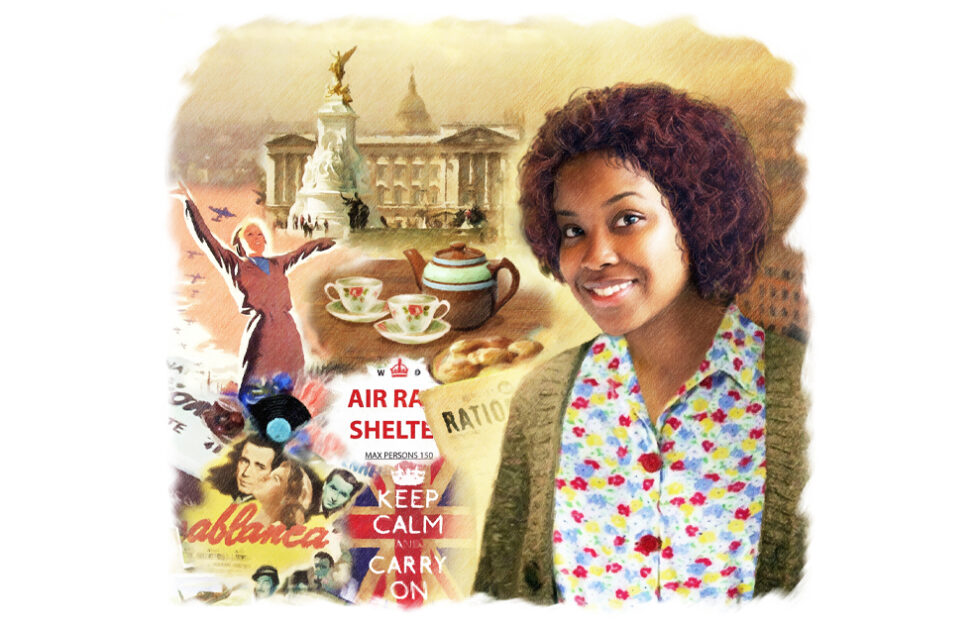
We wanted to share this Queen Elizabeth II story with you, first published in May 2016 for Her Majesty’s 90th birthday.
Cerene, my granddaughter, always visits on a Saturday morning. When she arrives, she’ll make me tea and she’ll take time to tell me all the things she did during the week.
She is too old for me to tell her stories like I used to when she was a girl.
She used to love my stories, though I think she stopped believing in some of them when she stopped believing in the tooth fairy or Father Christmas.
She now claims I used to embellish the stories.
“Especially the one about You Know Who,” she said the other week.
“I’m telling you, Cerene,” I replied. “That story is true.”
She laughed.
“Oh, Gran, what would I do without you?”
The story she so often talks about is not a long story and it’s very simple.
It is an event that happened before my bones got tired and slowed me down. It’s clear in my mind and, for as long as I live, I’ll never forget it.
It happened during the latter part of the war . . .
I was born in Tooting, London, in 1924 to a Trinidadian father who travelled to England on a wing and a prayer in 1896.
We lived with Mrs Sanderson, our landlady, who was kind. Next door the house was empty as Mr and Mrs Fox had lost a son in the war and moved to Scarborough to live.
We were on a corner plot so there was no house on the other side. There was an air-raid shelter nearby and when the siren blew, the families ran there. My father, Edmond, never ran to the shelter.
“If a bomb falls on that shelter, we’ll all be for it,” he used to say to me and Mum. “The only protection they give is in the mind.”
When the bombs started falling, we hid under the dining-room table and waited for the siren to stop. We cuddled up with our blankets and prayed with all our might.
Father said there was nothing better than a prayer to protect you.
In 1944 I turned twenty and enrolled in National Service. They offered me a position at the munitions factory, but I told them that I was a seamstress and that working in a factory would wear my hands out.
I took a fire marshal position instead, not thinking that if my hands got burned I would be in a worse position.
Food was scarce. We hardly ate sugar or meat and, after rationing, we were only allowed one egg a week. At one point they started selling whale meat.
Vera Lynn had a song called “We’ll Meet Again”, and someone changed the lyrics to “Whale meat again”.
We made a joke of everything in those days. It was the only way to get through it.
The event that Cerene refuses to believe happened in early 1945, near the end of the war.
Father was a soldier in the Army and was on leave. He was spending time with friends in Clapham.
Mrs Sanderson, the landlady, was at her daughter’s, so I was alone in the house as Mum was visiting her sister.
I didn’t have any warden duties that day, so I had baked potatoes on the oil stove for when my father came home, and a precious piece of ham in the larder.
The blackout curtains were up and I was reading by candlelight in the front room. Outside, I heard what I thought was a truck backfiring.
I doused the candle and looked out the window. There was some kind of military truck parked outside. A woman in Army uniform climbed out.
I opened the window a slit to hear her talking.
“We are in trouble now, Margaret,” she said.
I couldn’t make out her face in the dark, but she had a posh accent, like those actors in the movies. She was talking to another woman who was sitting in the passenger seat.
“Well, it wasn’t my fault,” Margaret said. “You’re the mechanic.”
“I have no idea why I listen to you. Every time you persuade me to go on one of your adventures we always get in trouble. If Mother or Father find out, they’ll be awfully cross.”
“They’re having dinner with the ambassador, so they won’t find out if you hurry up and change that tyre.”
I remember thinking that I had to help them, so I put my coat over my pyjamas and went outside.
“Hello,” I said. “You girls in trouble?”
“Hello,” the one in uniform said. “We’ve got a flat.”
I didn’t know a thing about trucks. Still, I offered. We were like that in the war. Everyone did their best to help each other.
The woman squinted at me. It really was pitch black. There was no street lighting and everyone had blackouts at their windows. Most people had already gone to bed, and those who hadn’t were sitting in their warm kitchens.
“I think we’ll be all right,” she said. “Thank you for asking.”
Despite it being cold, she removed her jacket and rolled up her sleeves.
“Come on, Margaret. You have to help.”
Margaret put her head out the open window.
“I can’t,” she said. “I don’t know the difference between a spanner and a wrench.”
When my eyes finally adjusted to the dark I could see that Margaret was a young girl, maybe fifteen or so. It was quite clear that she wasn’t going to move.
“I really don’t mind helping,” I offered.
“Oh, would you?” the woman said. “My sister is terribly spoilt.
“What’s your name?” she asked as she opened the back door of the truck.
“Iris Johnson.”
“Well, if you can help me lift out the spare tyre, Iris, we’ll have a go. How I’m going to manage in this poor light, I do not know.”
We struggled to remove the spare tyre and rolled it to the front passenger door. I was surprised at how heavy it was.
Margaret stepped out of the truck and stood watching while we worked.
The woman in uniform was very organised and determined. She had that spare tyre in place and ready to go in no time.
But, just as she was about to tighten the last bolt, the air-raid siren sounded and we heard the terrible whistling sound of a doodlebug in the air.
My heart started pounding and both young women seemed frozen to the spot.
“Follow me,” I ordered them. “Hurry.”
They followed me inside the house. I almost had to push them under the dining-room table.
Margaret’s voice was shaky when she asked, “Don’t you have a shelter?”
“There’s one a few doors down, but we never use it,” I said. “We sit under this table and pray.”
“Oh, but we should go to the air-raid shelter,” Margaret said, panicked.
“No,” the uniformed woman said. “Iris was kind enough to help us, so we will stay and pray.”
The three of us sat huddled under the table and held hands. I prayed loudly while my heart beat wildly.
When the siren ended we sat in complete silence for a while. The silence was just as terrifying.
The doodlebug should have dropped, but it wouldn’t have been the first time that a bomb had dropped and not exploded. We were lucky.
We tentatively climbed out from under the table and brushed ourselves down.
“That was scary,” Margaret said. “Too close for comfort, if you ask me.”
“I do hope no-one was hurt,” the uniformed woman stated.
She was shaking. In truth, we all were. In those days, every time the siren sounded, it strung your nerves out. You never got used to it.
Tea was the best thing for shot nerves, so I offered them the last of ours.
“That would be terribly kind.” The uniformed woman smiled.
I put the kettle on.
“Where are you from?” the uniformed woman asked as I handed her the steaming cup.
It was a question I was used to, what with me being the only person of colour for miles around.
“My father was born in Trinidad. I was born here.”
“Oh, Trinidad? In the West Indies. I’d love to visit one day.”
It surprised me that she knew where Trinidad was. Not many people did in those days.
My respect for her went up tenfold. Not only did she know how to change a tyre, she was worldly, too.
“I’d like a visit, too,” Margaret added. “I must admit, though, that I’d like to visit Antigua first. I hear that it’s very pretty.”
“I have a great fondness for our troops from the West Indies,” the uniformed woman said, “and the rest of the Commonwealth for that matter. Without them things may have been much worse.”
We drank our tea in the dark, and the woman in uniform asked me questions about my father. We ended up laughing as I told them both of his exploits. I was a storyteller even then.
“That was an awfully good cup of tea,” Margaret said. “But, if Lisbeth had her way she’d talk all night about the Commonwealth; we must get back.”
Lisbeth took hold of both my hands before she left.
“Thank you for helping change the tyre, but you won’t tell anyone you saw us, will you?”
I couldn’t understand why she would ask that of me, and though it was still very dark, she could probably see the question in my eyes.
“You see,” she continued, “Mother and Father will be terribly upset if they find out we’ve flown the coop again.”
Something made me stop and stare, but I couldn’t get to grips with that was odd about them. They were lovely girls and had kept me company when they could have run to the shelter.
“I won’t tell,” I said.
At the time I admit they were just two ordinary young girls to me, but they had left a last impression.
It was only some years later, at the Queen’s Coronation, that I realised who those two girls were.
As soon as I heard Elizabeth speak, I recognised the voice. I also found out years later that in 1945 Elizabeth had joined the Auxiliary Territorial Services as a motor mechanic.
And hadn’t Margaret called the woman in uniform Lisbeth? That’s when I started to put two and two together.
Cerene never really believed that story. Would the princesses Elizabeth and Margaret have been driving around London on their own? Unlikely. But then, hasn’t it just been recently announced that the two girls went AWOL on VE Day?
During their secret forays into the world they must have met many people. And now, more than ever, I am thoroughly convinced that I was one of them.
In fact, with this announcement about the sisters disappearing on VE Day, when Cerene arrives I might bring up that story again. I’m pretty sure she’ll believe me now.
Read more tributes and fiction in honour of the Queen.

